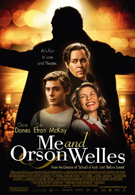I’ll come right out and say it: Richard Linklater is better than Me and Orson Welles. Sure, the indie superstar and inspiration to many a director (including Kevin Smith) is responsible for quite a few mainstream movies, but none have ever been so boring and lifeless as this film. School of Rock had Jack Black and a group of endlessly loveable kids. His Bad News Bears remake was surprisingly competent and true to the original. And of course, Dazed and Confused is a staple of the high school stoner genre. Unfortunately, Me and Orson Welles has none of the great things that made Linklater’s more accessible features so interesting.
The flick centers on Richard (Zac Efron), a high school kid with a knack for acting and the arts, who happens upon The Mercury Theatre where Orson Welles’ production of Julius Caesar is being prepared. By showing off his drum playing skills, Richard catches the eye of Welles himself, who gives the kid a role in his play as Lucius, Caesar’s servant. Here, we meet Sonja (Claire Danes), Welles’ assistant, a hard-to-get beauty who is chased by the entire cast but immediately has an eye for the young Richard.
The rest of the film follows the week leading up to the opening of the play as seen through Richard’s eyes, as he witnesses the sometimes genius, sometimes manic, always unfaithful and unreliable habits of Orson Welles (Christian McKay). During this time, Richard begins to fall for Sonja, who seems just as interested but in a somewhat less serious fashion. We see the trials and tribulations of a work directed by Welles, an auteur to the extent of being a control freak. He rarely gives credit where credit is due, rarely shows love for his actors even when they need it most, and argues extensively about minute details such as which step an actor should stand on. But this is the genius of Orson Welles, and he knows damn well that love can only come after success.
Me and Orson Welles ultimately fails because it centers on its two least appealing characters. Perhaps if a more competent young actor played Richard, the role would seem livelier and more interesting. Instead, Efron rarely sounds comfortable reciting his lines and only once or twice seems believable. You’d think a seasoned veteran like Claire Daines would be able to bring better game to the flick, but even she strikes out, playing Sonja lifelessly, never allowing us to fall in love with her or hate her when the time comes. Sonja is role meant for a sassier, more versatile actress, a girl with far more personality than Daines seems capable of showing.
The shining light in Me and Orson Welles ends up being Christian McKay. McKay’s portrayal of Welles, though not perfect, gives the film the blood that its lead actors fail to give. Every time he enters a room, a sort of wave is felt throughout the theatre, as though the audience has been collectively poked with a stick. We see Welles in all his womanizing, conniving and beautifully artistic glory. When he does wrong, we feel it, and when he loves, we feel it even more.
McKay isn’t the film’s only saving grace, though. Most of the second act is strong, as we follow the main preparations for Julius Caesar, the conflict between Sonja and Richard (the only moment where Efron shows some ability), and the opening night of the play. It’s as though the actors and the writers took their time getting started then found their stride about two thirds through. Seeing the vast intricacies of a theatre production (especially one lead by Orson) along with a reenactment of Welles’ now legendary interpretation of Julius Caesar is a wonder on screen.
It’s a struggle to get through the beginning and end of Me and Orson Welles. This may be an editing problem, but it may also be Richard. It’s hard to care for Richard’s struggle to become an actor and woo an older woman (there’s also a minor subplot that involves Richard and a cute, modest writer). It’s harder to care about Sonja and her shallow intentions. If Orson were an ensemble piece that focused on the lives of the cast members or even only on Orson, it would’ve been more successful. Instead, Richard Linklater’s talent never shines through, as he’s forced to focus on lame characters, while placing everything interesting in the background. But something good comes out of all of this. Me and Orson Welles definitely makes you want to revisit Citizen Kane.
Your Daily Blend of Entertainment News

